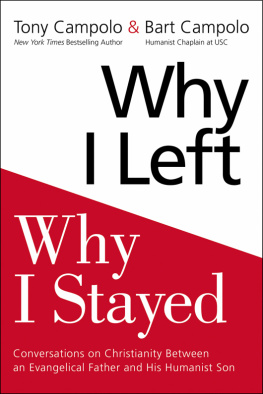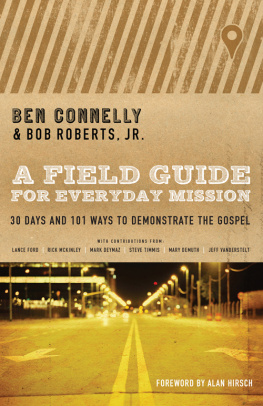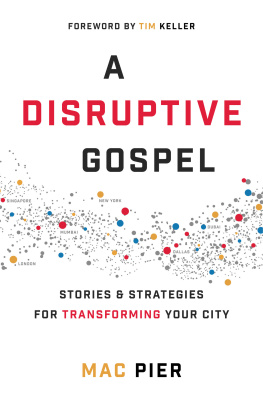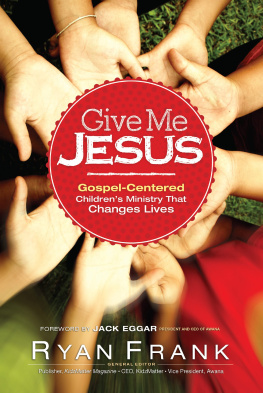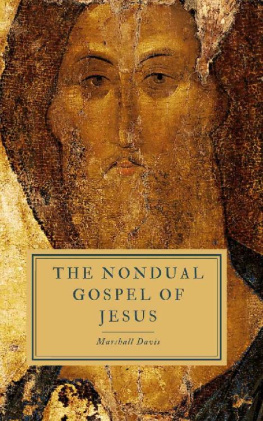Tony Campolo - Stories That Feed Your Soul
Here you can read online Tony Campolo - Stories That Feed Your Soul full text of the book (entire story) in english for free. Download pdf and epub, get meaning, cover and reviews about this ebook. year: 2010, publisher: Baker Publishing Group, genre: Religion. Description of the work, (preface) as well as reviews are available. Best literature library LitArk.com created for fans of good reading and offers a wide selection of genres:
Romance novel
Science fiction
Adventure
Detective
Science
History
Home and family
Prose
Art
Politics
Computer
Non-fiction
Religion
Business
Children
Humor
Choose a favorite category and find really read worthwhile books. Enjoy immersion in the world of imagination, feel the emotions of the characters or learn something new for yourself, make an fascinating discovery.
- Book:Stories That Feed Your Soul
- Author:
- Publisher:Baker Publishing Group
- Genre:
- Year:2010
- Rating:4 / 5
- Favourites:Add to favourites
- Your mark:
- 80
- 1
- 2
- 3
- 4
- 5
Stories That Feed Your Soul: summary, description and annotation
We offer to read an annotation, description, summary or preface (depends on what the author of the book "Stories That Feed Your Soul" wrote himself). If you haven't found the necessary information about the book — write in the comments, we will try to find it.
Stories That Feed Your Soul — read online for free the complete book (whole text) full work
Below is the text of the book, divided by pages. System saving the place of the last page read, allows you to conveniently read the book "Stories That Feed Your Soul" online for free, without having to search again every time where you left off. Put a bookmark, and you can go to the page where you finished reading at any time.
Font size:
Interval:
Bookmark:


2010 Tony Campolo
Published by Baker Books
a division of Baker Publishing Group
P.O. Box 6287, Grand Rapids, MI 49516-6287
www.bakerbooks.com
Baker Books edition published 2014
ISBN 978-1-4412-2376-0
Previously published by Regal Books
Ebook edition originally created 2011
All rights reserved. No part of this publication may be reproduced, stored in a retrieval system, or transmitted in any form or by any meansfor example, electronic, photocopy, recordingwithout the prior written permission of the publisher. The only exception is brief quotations in printed reviews.
Library of Congress Cataloging-in-Publication Data is on file at the Library of Congress, Washington, DC.
All Scripture quotations, unless otherwise indicated, are taken from the New Revised Standard Version Bible, copyright 1989, by the Division of Christian Education of the National Council of the Churches of Christ in the U.S.A. Used by permission. All rights reserved.
Other versions used are:
KJVKing James Version. Authorized King James Version.
NIVScripture taken from the Holy Bible, New International Version. Copyright 1973, 1978, 1984 by International Bible Society. Used by permission of Zondervan Publishing House. All rights reserved.
NKJVScripture taken from the New King James Version. Copyright 1979, 1980, 1982 by Thomas Nelson, Inc. Used by permission. All rights reserved.
NLTScripture quotations marked NLT are taken from the Holy Bible, New Living Translation, copyright 1996. Used by permission of Tyndale House Publishers, Inc., Wheaton, Illinois 60189. All rights reserved.
Dedicated to Joel Kent Holland: a man of integrity, and a brother-in-law who loves God and loves his family.
CONTENTS
INTRODUCTION
The gospel is seldom heard. It is overheard, said Sren Kierkegaard, the Danish existentialist philosopher and theologian.
Kierkegaard compared reading the Bible to the way in which you might overhear a conversation. He asks you to imagine standing behind two men on a street corner, while waiting for a break in the traffic so you can cross the street. The men are talking about someoneand then, suddenly, you realize they are talking about you. You listen intently, because what they are saying is both critical and revealing about who you are. So it is with the reading of Scripture. As you read the stories and conversations recorded in the Bible thousands of years ago, you are likely to become aware that what is being said has been written about you. While you are not being addressed directly, the words, nevertheless, seem to deal with your struggles, your needs, your questions, and your hopes. Sometimes, what is overheard can be quite disturbing.
Within the Bible itself, we find stories of people who overhear things that at first seem to be about others, only to realize that they themselves are being described. As a case in point, this is what happened to David, Israels most notable king. Through a story, told to him by Nathan the prophet, David is forced to face up to a dark side of himself and the horrible evil he had done to a beautiful woman and her innocent husband (see 2 Sam. 12:1-7).
One day, King David looked down from the roof of his palace and saw a woman named Bathsheba washing herself. David lusted after her and decided to translate his lusts into action and to have Bathsheba for himself. Bathsheba was already married, and her husband, Uriah, one of Israels generals, was away with the army, at war. To make a long story very short, David slept with Bathsheba and, when the king knew she had become pregnant, he arranged to have Uriah placed at the front of the battle so that he was certain to be killed. Once Uriah was out of the way, David made Bathsheba his own wife.
To Nathan, Gods prophet, fell the task of forcing David to face up to the enormity of his evil. Nathan did not condemn the king directly, but chose instead the indirect method of telling David a story that would force him to condemn himself. This is the story:
A certain rich man owned a large herd of sheep and possessed all the good things that a wealthy man might enjoy. Nevertheless, when this rich man had a visitor for dinner, he took the beloved lamb of a poor neighbora lamb that was loved like a child. He killed the lamb and served it for dinner, leaving the poor farmer heartbroken.
King David was outraged by the story Nathan told him and demanded that the greedy rich man be brought to justice and severely punished. Only then, when Nathan pointed his finger at the king and said, Thou art the man! (KJV), did David realize that the story was really about himself, and end up judging and condemning himself. Nathans story was, as Kierkegaard would say, the indirect method by which David overheard the horror of the kind of person he had become.
Most of us realize that there is both an objective and a subjective side to becoming a Christian. On the one hand, we accept a need for sound doctrine. We recognize that our faith must be built on solid propositional truths. On the other hand, however, we sense that there is a need for a personal (subjective) and transforming encounter with the resurrected and ever-present Christ.
When it comes to propositional truth, I believe there is no better statement of the doctrines that are essential for a Christian to believe than the Apostles Creed. In this creed, we find a brief, but comprehensive, survey of the teachings that have historically defined the Christian faith. The Apostles Creed goes back more than 1,500 years.
Sound doctrine, most of us realize, is not enough. Becoming a Christian involves something more than simply saying yes to a list of biblically prescribed propositional truths. If giving intellectual assent to the fact that Jesus died on the cross for our sins would provide believers with salvation, then Satan would be saved. James 2:19 tells us that even the demons believeand tremble! (NKJV). That something more that is necessary for salvation comes from subjectively surrendering to God. It requires a yielding to the changes that God wants to effect in our lives. It involves becoming emotionally, psychologically and spiritually open to the transformations that the eighth chapter of Romans describes as the work of the Holy Spirit (NLT).
Evangelicals believe that Jesus waits at the door of the innermost recesses of our being, saying, Behold, I stand at the door, and knock (Rev. 3:20, KJV) and that He longs for each of us to make the existential decision to open ourselves up to what He wants to do in our lives.
Two thousand years ago, Jesus told stories in order to help His disciples and other listeners more fully understand His teachings. The parables of Jesus were used to make clear many of the theological truths He wanted His disciples to grasp. For instance, when seeking to convey what He wanted them to know about the future of the world, Jesus told His disciples the parable of the wheat and the tares:
The kingdom of heaven may be compared to someone who sowed good seed in his field; but while everybody was asleep, an enemy came and sowed weeds among the wheat, and then went away. So when the plants came up and bore grain, then the weeds appeared as well. And the slaves of the householder came and said to him, Master, did you not sow good seed in your field? Where, then, did these weeds come from? He answered, An enemy has done this. The slaves said to him, Then do you want us to go and gather them? But he replied, No; for in gathering the weeds you would uproot the wheat along with them. Let both of them grow together until the harvest; and at harvest time I will tell the reapers, Collect the weeds first and bind them in bundles to be burned, but gather the wheat into my barn (Matt. 13:24-30).
Next pageFont size:
Interval:
Bookmark:
Similar books «Stories That Feed Your Soul»
Look at similar books to Stories That Feed Your Soul. We have selected literature similar in name and meaning in the hope of providing readers with more options to find new, interesting, not yet read works.
Discussion, reviews of the book Stories That Feed Your Soul and just readers' own opinions. Leave your comments, write what you think about the work, its meaning or the main characters. Specify what exactly you liked and what you didn't like, and why you think so.


